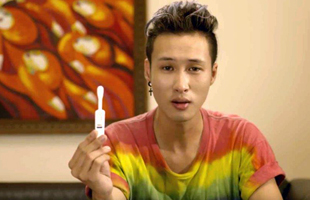
PATH (Viet Nam)/K. Green
HIV self-testing is an empowering and innovative way to reach the estimated 1.8 million people living with HIV in Asia and the Pacific who do not know their status. The new WHO guidelines released ahead of World AIDS Day this year recommend that self-testing be offered as an additional HIV testing service. For the Western Pacific Region, having the option for an individual to perform an HIV test on his or her own will help to overcome legal and social barriers to HIV service access often faced by key populations, including men who have sex with men, people who inject drugs, sex workers and transgender people.
“We strongly support making HIV self-testing available given that it ensures high confidentiality, which is very important to people experiencing stigma and discrimination,” stated Mr Choub Sok Chamreun, executive director of the Khmer HIV/AIDS NGO Alliance (KHANA). “It can be one of the innovative tools to find those who are hard to reach and have yet to access services, and help reach that very last person living with HIV in Cambodia to achieve the goal to end AIDS. Equally important is that it enables the individual to take ownership and leadership for his or her own health.” Mr Chamreun reported that recent surveys show high acceptability for HIV self-testing among Cambodian entertainment workers, men who have sex with men and transgender women.
Some countries in the Western Pacific Region have already taken steps to support HIV self-testing. In 2014, Australia lifted restrictions on HIV self-testing and amended regulations to allow the sale of HIV rapid diagnostic tests for self-testing. Viet Nam initiated pilots in three provinces and launched its first HIV self-testing services in August 2016. China also has established pilots to enhance access to HIV self-testing, including delivery of oral self-testing kits combined with blood or urine-based test kits to key populations through community-based organizations. On several university campuses in China, vending machines offer low-cost, urine-based HIV testing kits that can be sent for HIV testing at a quality assured laboratory. Testers can access results anonymously using an app and a unique identifier.
Informal and unregulated sales of self-testing kits through private pharmacies and online retailers in the Region are occurring and will require a public health response. As countries offer HIV self-testing through formal channels, including community-based, facility-based, and Internet-based, WHO recommends a number of considerations, among which are policy and regulatory frameworks that regulate sales to ensure quality and safety of HIV rapid diagnostic tests used for self-testing.
Additional considerations include service delivery approaches that would complement existing HIV testing services and linkages to confirmatory testing and treatment. HIV self-testing requires self-testers with a reactive (positive) result to receive further testing from a trained provider to confirm the result. It is therefore important that self-testers receive clear communication on how to interpret test results and are able to easily access health services for follow-up testing and subsequent treatment, if needed.
Dr Zunyou Wu, director of the National Center for AIDS and Sexually Transmitted Disease Control and Prevention, shares China’s experience, stating: “We have seen online sales of self-testing kits substantially rising, so online platforms such as social networking sites are efficient tools for delivering information and support to self-testers. We are closely monitoring the number of people receiving confirmatory testing to ensure it is at least what we expect based on sales numbers. It is important that HIV-positive individuals are connected to treatment services.”
